Baffling Prehistoric Maze Stones In Hemet And San Jacinta Valley, California
A. Sutherland - AncientPages.com - Will we ever solve the mystery of California's maze stones?
A mysterious prehistoric maze stone is located on a hill west of the city of Hemet, in the San Jacinto Valley in Riverside County, California, approximately 90 miles southeast of Los Angeles.
It is a maze-like prehistoric carving in a rock, of which purpose has never been explained. It was discovered in 1914 and it dates back to at least 2000 BC.
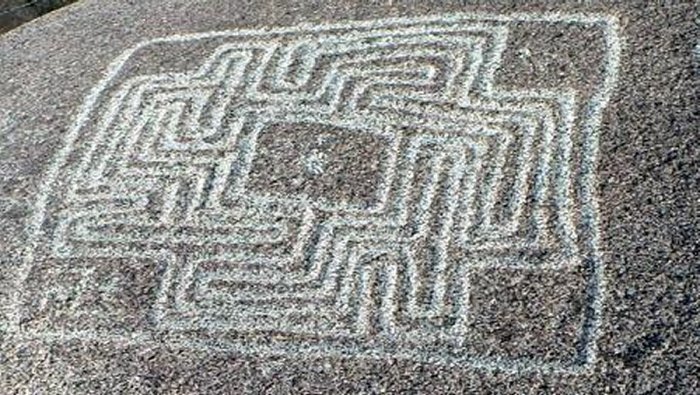
About 50 boulders with labyrinth-carvings have been identified in California’s counties such as Riverside, Imperial, San Diego and Orange.
Hemet’s gray boulder is covered with the intricate design of a labyrinth and enclosed in a three and a half foot square.
The "maze" consists of two rectangular boxes—one large and containing the other; centered. If one traces the patterns with different colored markers, one would find that between the boxes are two contiguous geometric patterns that resemble a maze. One "maze" is contained by the other on the left hand side, according to World Heritage Encyclopedia.
The swastika that appears in the lower left hand corner is not part of the original work as evidenced by a 1930's era photo featured in the Hemet Centennial calendar (featured photo of July 2010; available from the Hemet Museum located at the old train depot on the northwest corner of State and Florida).
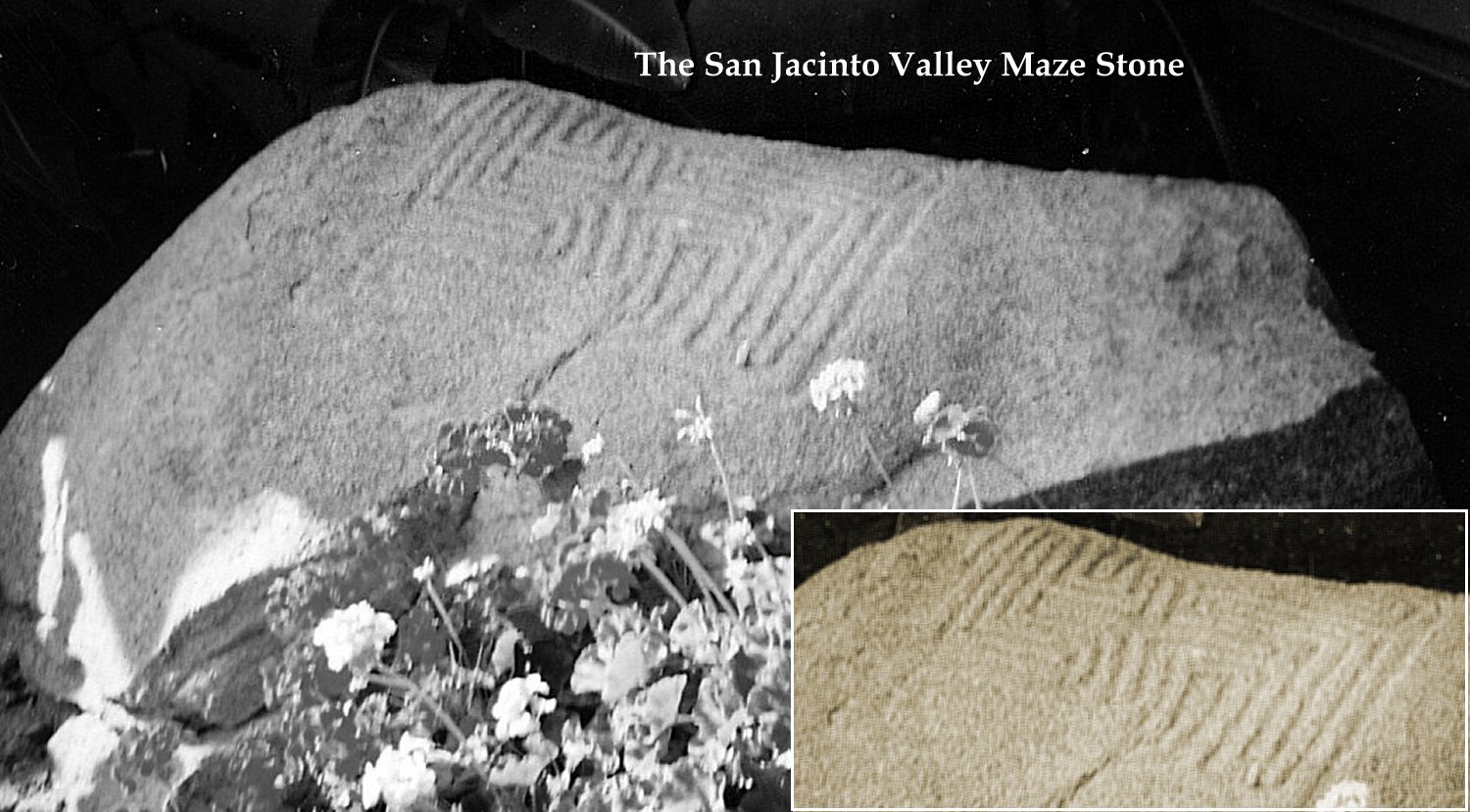
The San Jacinto Maze Stone was found about 3 miles north of the Hemet Maze Stone. It was later moved to the Soboba Indian Reservation. Thousands of years ago, the descendants of the Soboba people are those who have lived on and occupied the land. Photo credits: Visit San Jacinto Valley
Rock art is very difficult to date. However, based on 'desert varnish', which is the outer layer substance which forms over time and darkens the surface of rocks, the maze-like carving was probably made much earlier between 3,000 and 4,000 years ago.
See also:
Intricate Mazes And Labyrinths: Mysterious Symbols Of Beauty And Confusion Or Communication Signals
About 3 miles north of the Hemet Maze Stone, there was found the San Jacinto Maze Stone, which was later moved to the Soboba Indian Reservation. Thousands of years ago, the descendants of the Soboba people are those who have lived on and occupied the land, which is presently known as the cities of San Jacinto, Hemet, Valle Vista and Winchester.
There are other mazes in the Hemet area, including the 2 1/2-foot-square Ramona Maze Stone, similar in design to the Hemet maze. It was found by hikers in 1977 after heavy rains washed away ground cover and exposed the rock, on which it was carved.
Ten miles north of Hemet on a large boulder is an extremely complex 4-foot-square maze outlined in red paint. Part of the maze was destroyed by four shotgun blasts in the early 1960s, according to researcher and archaeologist Daniel F. McCarthy, who has recorded and photographed 50 Indian mazes
About 50 boulders with labyrinth-carvings have been identified in California’s counties such as Riverside, Imperial, San Diego and Orange. Additionally approximately 14 similar ones have been located in a desolate area of Palm Springs.
All maze stones are located on boulder-strewn mountainsides in these regions and all of them have been discovered within 150 miles of each other; it is interesting to note that all the stones are rectangular-shaped, although their size varies from only 4 inches to several feet in diameter.
It remains a mystery who carved the mazes, when, why and what they represent.
Written by – A. Sutherland AncientPages.com Staff Writer
Copyright © AncientPages.com All rights reserved. This material may not be published, broadcast, rewritten or redistributed in whole or part without the express written permission of AncientPages.com
Expand for referencesMore From Ancient Pages
-
 Extremely Rare 2,700-Year-Old Black Stone Seal Depicting A Winged Genie Discovered In Jerusalem
Archaeology | Sep 2, 2024
Extremely Rare 2,700-Year-Old Black Stone Seal Depicting A Winged Genie Discovered In Jerusalem
Archaeology | Sep 2, 2024 -
 Biblical Event Verified By Study Of Earth’s Magnetic Field?
Archaeology | Jan 4, 2024
Biblical Event Verified By Study Of Earth’s Magnetic Field?
Archaeology | Jan 4, 2024 -
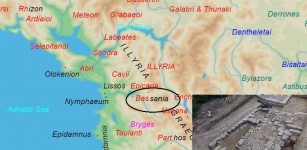 2,000-Year-Old Lost Illyrian City Unearthed In Albania By Polish Archaeologists
Archaeology | Jun 13, 2018
2,000-Year-Old Lost Illyrian City Unearthed In Albania By Polish Archaeologists
Archaeology | Jun 13, 2018 -
 Tuatha De Danann: Mythical Race Of God-Like Beings With Supernatural Abilities In Celtic Mythology
Celtic Mythology | Feb 26, 2019
Tuatha De Danann: Mythical Race Of God-Like Beings With Supernatural Abilities In Celtic Mythology
Celtic Mythology | Feb 26, 2019 -
 Fascinating Medieval Knight Armor History
Featured Stories | Oct 23, 2018
Fascinating Medieval Knight Armor History
Featured Stories | Oct 23, 2018 -
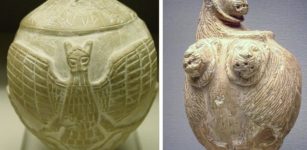 ‘Stone Club Head Of Mesilim’ Probably The Most Powerful Sumerian Ruler At That Time
Artifacts | Oct 12, 2017
‘Stone Club Head Of Mesilim’ Probably The Most Powerful Sumerian Ruler At That Time
Artifacts | Oct 12, 2017 -
 New DNA Evidence Rewrites Ancient History Of Pompeii
DNA | Nov 8, 2024
New DNA Evidence Rewrites Ancient History Of Pompeii
DNA | Nov 8, 2024 -
 Giant Egyptian Pyramids Hidden Beneath The Sand Dismissed By Egyptologists Without Investigation!
Archaeology | Jun 29, 2020
Giant Egyptian Pyramids Hidden Beneath The Sand Dismissed By Egyptologists Without Investigation!
Archaeology | Jun 29, 2020 -
 On This Day In History: Zhao Kuangyin Became Emperor Taizu Of Powerful Song Dynasty – On Feb 4, 960
News | Feb 4, 2017
On This Day In History: Zhao Kuangyin Became Emperor Taizu Of Powerful Song Dynasty – On Feb 4, 960
News | Feb 4, 2017 -
 Cooper’s Ferry Site In Western Idaho Was Inhabited 16,000 Years Ago
Archaeology | Sep 3, 2019
Cooper’s Ferry Site In Western Idaho Was Inhabited 16,000 Years Ago
Archaeology | Sep 3, 2019 -
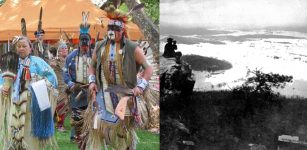 Ancient Native American Stories Of Great Floods In Tennessee Confirmed By Scientists – 1867 Flood Was Not The Worst One
News | Aug 26, 2020
Ancient Native American Stories Of Great Floods In Tennessee Confirmed By Scientists – 1867 Flood Was Not The Worst One
News | Aug 26, 2020 -
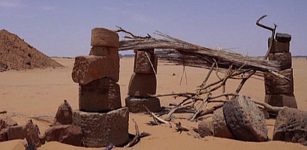 Illegal Gold-Hunting Diggers Damaged Sudan’s 2,000-Year-Old Historic Site
Archaeology | Aug 24, 2020
Illegal Gold-Hunting Diggers Damaged Sudan’s 2,000-Year-Old Historic Site
Archaeology | Aug 24, 2020 -
 Luna Settlement: First Multi-Year European Settlement Identified In Pensacola, Florida
Archaeology | Dec 26, 2015
Luna Settlement: First Multi-Year European Settlement Identified In Pensacola, Florida
Archaeology | Dec 26, 2015 -
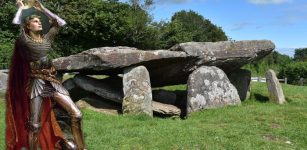 Excavation Of A Mysterious 5,000-Year-Old Tomb Linked To King Arthur Has Started
Archaeology | Jul 5, 2022
Excavation Of A Mysterious 5,000-Year-Old Tomb Linked To King Arthur Has Started
Archaeology | Jul 5, 2022 -
 Missing Pieces Of The Magnificent Golden Tree Of Lucignano Discovered
Archaeology | Nov 6, 2023
Missing Pieces Of The Magnificent Golden Tree Of Lucignano Discovered
Archaeology | Nov 6, 2023 -
 Rare Ancient Drawings Offer Evidence Moluccan Boats Visited Australia From Indonesia?
Archaeology | May 31, 2023
Rare Ancient Drawings Offer Evidence Moluccan Boats Visited Australia From Indonesia?
Archaeology | May 31, 2023 -
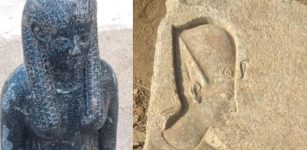 Artifacts Unearthed In Mit-Rahina, South Of Giza, Egypt
Archaeology | Jul 29, 2020
Artifacts Unearthed In Mit-Rahina, South Of Giza, Egypt
Archaeology | Jul 29, 2020 -
 DNA Says You’re Related To A Viking, A Medieval German Jew Or A 1700s Enslaved African? What A Genetic Match Really Means
DNA | Jun 7, 2024
DNA Says You’re Related To A Viking, A Medieval German Jew Or A 1700s Enslaved African? What A Genetic Match Really Means
DNA | Jun 7, 2024 -
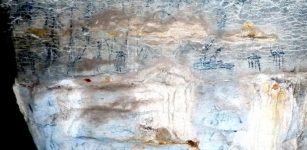 Madagascar Cave Art Hints At Ancient Connections Between Africa And Asia
Featured Stories | Dec 18, 2023
Madagascar Cave Art Hints At Ancient Connections Between Africa And Asia
Featured Stories | Dec 18, 2023 -
 Kallikantzaroi: Naughty Nocturnal Goblins Emerge From Underground Only During Twelve Days Of Christmas
Ancient Traditions And Customs | Jan 3, 2025
Kallikantzaroi: Naughty Nocturnal Goblins Emerge From Underground Only During Twelve Days Of Christmas
Ancient Traditions And Customs | Jan 3, 2025
